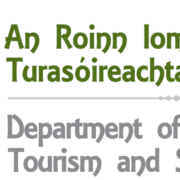Giving Ireland 2024 Report Launch with Technological University Dublin
Today, we launched our Giving Ireland 2024 Report in collaboration with Technological University Dublin at LinkedIn, Dubin. This year’s Giving Ireland Report examines the funding of Ireland’s registered nonprofits in 2022, as the sector continued its recovery from the Covid-19 pandemic. This is the 4th Giving Ireland Report, building on over a decade of research into nonprofit funding.
The journey began in 2010 with the launch of Fundraising Performance: The First Annual Report on Fundraising in Ireland by 2into3. That inaugural study analysed the financial accounts of just 80 nonprofit organisations for 2009, with data personally provided by participants. Fourteen years later, Giving Ireland has evolved into a comprehensive analysis of the sector, mapping its funding landscape and reflecting its growth and increasing complexity.
About Giving Ireland
Giving Ireland is a collaboration between 2into3 and TU Dublin which seeks to provide a platform for the Sector that will foster collaboration, provide insights and encourage collective action. The research is completed by TU Dublin.
Our most recent report, Giving Ireland Report 2024, provides an analysis of how the Irish nonprofit sector was funded in 2022. This is in response to an ongoing need for objective information on fundraising in Ireland. Giving Ireland’s objective is to provide insights into charitable giving in Ireland and support informed decision-making. The report is intended to stimulate dialogue while encouraging more detailed and transparent reporting of fundraising data.
Giving Ireland 2024 Report Launch

2into3 Giving Ireland Report 2024 Launch
Our launch event, in collaboration with Technological University Dublin, was held at LinkedIn One Wilton Place, Dublin 2. The event commenced with an introduction from our MC, Ivan Cooper, CEO of The Wheel and followed by forewords from Dennis O’Connor, CEO of 2into3 and Etain Kidney, Head of School, Marketing & Entrepreneurship at Technological University Dublin.
Giving Ireland 2024 Report key findings were then outlined by PhD Senior Researcher and Giving Ireland Author, Niamh Carruthers. Niamh discussed the funding model and overall context from 2022, before delving into the report methodology, change in total income, public funding, earned income, international comparisons and key takeaways from Giving Ireland 2024.
Hereafter, we were joined by our panellists, Iseult Ward, CEO and Co-founder of FoodCloud and John-Mark McCaffrey, CEO of Threshold, who provided insights on their fundraising journey, discussed the key figures from this year’s report and how we can collectively improve the future of data in the sector.
What’s next for Giving Ireland?

Niamh Carruthers, PhD Senior Researcher and Giving Ireland 2024 Report Author
With the implementation of the National Philanthropy Policy, we anticipate a renewed focus on data quality and research. As the data baseline improves, we plan to expand our analyses, which we have narrowed somewhat in recent years due to poor data availability.
Looking ahead to 2025, we expect changes to the Giving Ireland methodology that will enable us to enhance and expand our insights. We encourage readers to reflect on what they would like to see in future reports and share their feedback with us. Finally, we extend our thanks to Ireland’s nonprofits for their vital contributions to society and their continued support of this research.
Get in Touch
To view the full report, visit the Giving Ireland website here.
If you have feedback, questions or comments on this years report, please contact PhD Senior Researcher and Giving Ireland 2024 Report Author, Niamh Carruthers at niamh.carruthers@2into3.com. For marketing related queries, contact Eilís O’Boyle at eilis.oboyle@2into3.com.
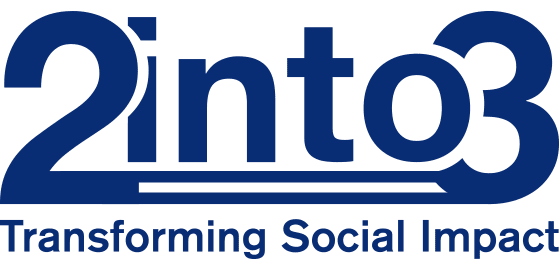
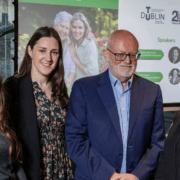
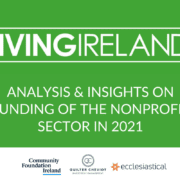
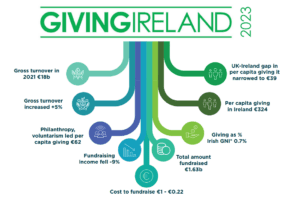


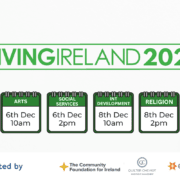
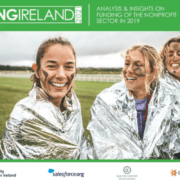
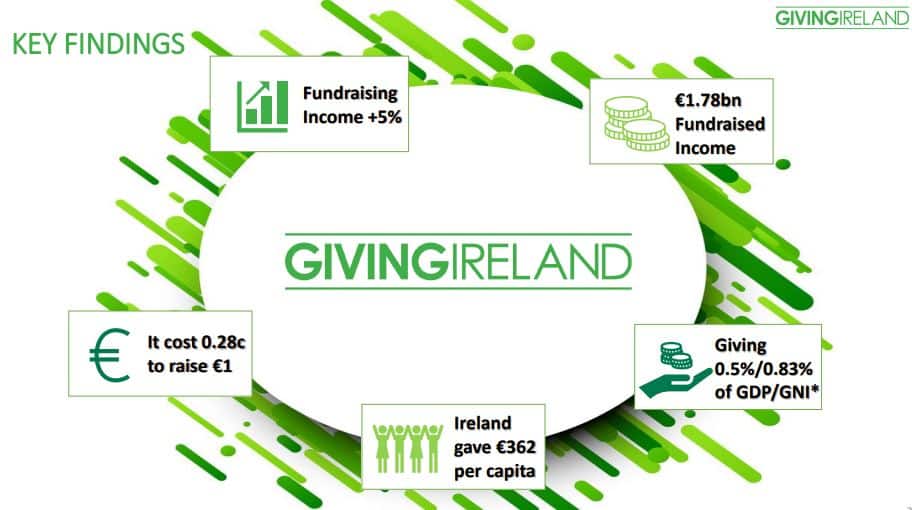
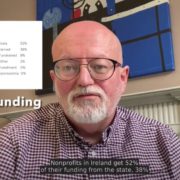


 Last week was momentous for five Irish Charities following the passing of Elizabeth O’Kelly. Mrs. O’Kelly donated €6 million each to The Irish Cancer Society, The Irish Heart Foundation, The Irish Kidney Association, The Irish Society for Autistic Children and the RNLI. For the Irish Cancer Society, which is one of Ireland’s largest, most prominent charities the gift was the largest the organisation has ever received and represents the income of two annual Dafodil Days.
Last week was momentous for five Irish Charities following the passing of Elizabeth O’Kelly. Mrs. O’Kelly donated €6 million each to The Irish Cancer Society, The Irish Heart Foundation, The Irish Kidney Association, The Irish Society for Autistic Children and the RNLI. For the Irish Cancer Society, which is one of Ireland’s largest, most prominent charities the gift was the largest the organisation has ever received and represents the income of two annual Dafodil Days.
 In Q1, 2018 it cost organisations 11cent to raise €1 from Legacies. This finding emerged from the latest 2into3 Quarterly Fundraising Monitor (now called Irish Giving Index).
In Q1, 2018 it cost organisations 11cent to raise €1 from Legacies. This finding emerged from the latest 2into3 Quarterly Fundraising Monitor (now called Irish Giving Index).